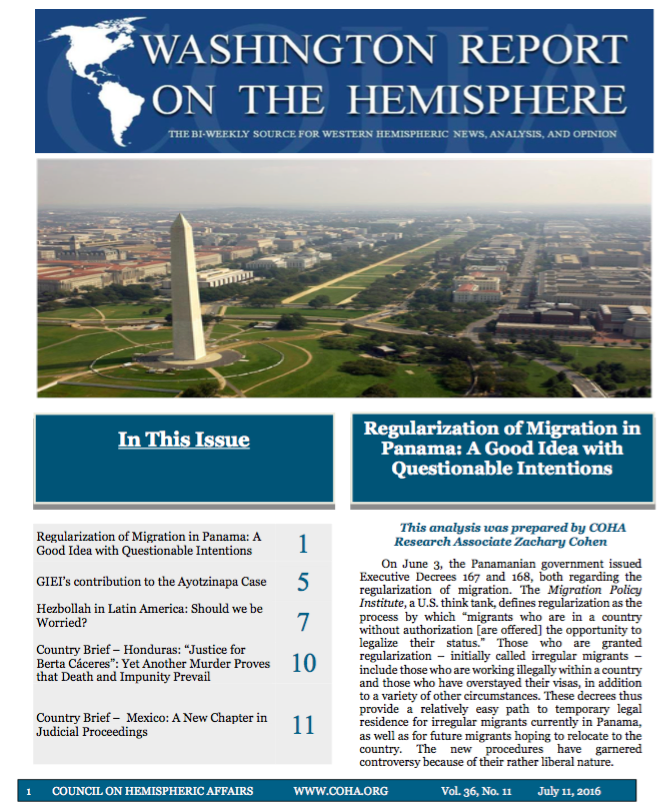WRH Volume 36 Issue 11
The Latest Washington Report on the Hemisphere is out:
In the latest issue, you will find the following analyses:
Articles:
1 – “Regularization of Migration in Panama: a Good Idea with Questionable Intentions” by COHA Research Associate Zachary Cohen
On June 3, the Panamanian government issued Executive Decrees 167 and 168, both regarding the regularization of migration. The Migration Policy Institute, a U.S. think tank, defines regularization as the process by which “migrants who are in a country without authorization [are offered] the opportunity to legalize their status.” Those who are granted regularization – initially called irregular migrants – include those who are working illegally within a country and those who have overstayed their visas, in addition to a variety of other circumstances. These decrees thus provide a relatively easy path to temporary legal residence for irregular migrants currently in Panama, as well as for future migrants hoping to relocate to the country. The new procedures have garnered controversy because of their rather liberal nature.
2 – “GIEI’s Contribution to the Ayotzinapa Case” by COHA Research Associate Pedro Izquierdo
On September 26, 2014, 43 college students from the Raul Isidro Burgos School of Ayotzinapa were forcibly taken by the Mexican police and handed over to a nearby drug cartel known as Guerreros Unidos who supposedly killed the students. Since then, the missing students are considered to be presumed dead by the government while families and loved ones reject their statement and continue to frantically search for them and gather information on their possible whereabouts. The evening’s events began after a violent clash had taken place between policemen and students in the city of Iguala, the capital of the Mexican state of Guerrero. Six students and three civilians were later killed during the confrontation before the other 43 students were taken. This incident is considered by the Mexican press and people as one of the worst cases of human rights abuses in the country’s recent political history and has created an attitude of distrust from many Mexican people towards the government and the country’s corrupt judicial institutions. During the aftermath, different independent organizations and foreign actors have carried out various investigations. Among these organizations is the Interdisciplinary Group of Independent Experts (GIEI), a group commissioned by the Inter-American Commission on Human Rights (IACHR).
3 – “Hezbollah in Latin America: Should we Worried?” by COHA Research Associate Julian Palmer
Government corruption, armed conflict, and drug-related violence continue to plague Latin America. The ongoing government meltdown that began in Brazil in 2015 has clouded the country’s economic and political future. Although the recent peace agreement between the Revolutionary Armed Forces of Colombia (FARC) and the Colombian government is a significant victory, many drug cartels and criminal groups remain active in Colombia. Venezuela is also suffering from severe economic and political crises. To make matters worse, the Shiite terrorist organization, Hezbollah, is allegedly present in Latin America and active in the underground criminal nexus, contributing to the violence and political quagmire that has engulfed much of the region. Indeed, Admiral Kurt Tidd of the U.S. Southern Command (SOUTHCOM) considers “the illicit networks” of Latin America to be “the biggest security challenge” facing the Western Hemisphere. However, one must be aware of the consequences of such statements. The situation may sound worse than it actually is because some unprincipled politicians frequently exaggerate and frame stories for political purposes. Propaganda of this nature is dangerous because it tends to increase public support for military interventions, expand the power of government, and limit the rights of the people.
Country Briefs:
1 – Honduras – “”Justice for Berta Cáceres”: Yet Another Murder Proves that Death and Impunity Prevail” by COHA Research Associate Emma Tyrou
Four months after the heinous assassination of renowned Indigenous and environmental activist Berta Cáceres, impunity still prevails in Honduras. On July 6, yet another member of the Civic Council of Popular and Indigenous Organizations (COPINH, the organization Berta co-founded 23 years ago to defend indigenous and environmental rights) was murdered. Lesbia Yaneth Urquía had joined COPINH after the coup against the democratically elected President, Manuel Zelaya in 2009, and was a prominent figure in the fight against the hydroelectric dam Aurora I, in the municipality of San José, La Paz. The sham investigation carried out internally has so far spared the intellectual authorship behind Cáceres’ death. A similar scenario can be expected regarding the most recent crime, as the government remains deaf to the numerous calls for the investigation to be carried out by an independent group of experts. However, the wave of indignation spurred after the crimes has intensified international concern about the massive violations of human rights in Honduras and spurred calls for an end to U.S. military funding of the Hernandez administration.
2 – Mexico – “ A New Chapter in Judicial Proceedings” by COHA Research Associate Maria Fabrizio
June 2016 marks the deadline for the official and complete implementation of Mexico’s new judicial system aimed at improving judicial transparency and integrity. This transformation has been in the works since 2008 when Mexico’s congress approved a constitutional amendment that mandated judicial reform. The 2008 amendment emerged after a long push for a more trustworthy judicial system. This push toward a new judicial system began in the 1990s during a democratic movement sparked by the removal of the Institutional Revolutionary Party (PRI) party from power. Prior to being ousted in 2000, the PRI essentially single-handedly ruled Mexico and prevented meaningful change to Mexico’s institutions. The PRI’s removal from power in 2000 renewed Mexico’s move toward true democracy, and the 2008 judicial reform amendment marks a powerful extension of this movement.
To order this issue:


